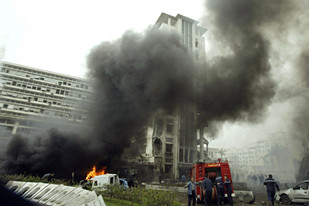
Explosions rocked the capital city of Algeria on Wednesday. At least 23 people have been reported killed., a photo by Pan-African News Wire File Photos on Flickr.
Africa fears al-Qaida push after Libya war
Published: Sept. 8, 2011 at 12:44 PM
ALGIERS, Algeria, Sept. 8 (UPI) -- Al-Qaida in the Islamic Maghreb has stepped up attacks in Algeria amid growing fears that a surge of jihadists and plundered weapons from Libya threatens North African countries.
AQIM, composed mainly of hardened Algerian fighters who have fought the government since 1992, has increased the range and tempo of its attacks in Algeria's north in recent weeks.
Eighteen people, 16 of them army officers, were killed in a suicide bombing Aug. 26 on a military academy at Cherchell, 110 miles west of Algiers.
It was the third such attack since mid-July. The last suicide attack in Algeria was July 25, 2010. Other clashes have been reported in Mali and Mauritania.
The collapse of Moammar Gadhafi's regime in Libya, Algeria's eastern neighbor, has rung alarm bells in Algiers and other North African capitals across the Sahara and the semi-arid Sahel region to the south.
The rebel victory has triggered an influx of hundreds of Gadhafi fighters into neighboring states, such as Algeria, that are already grappling with armed militants and smugglers.
The return of heavily armed Tuareg tribesmen from Mali and Niger who fought for Gadhafi until his forces were routed by NATO-backed rebels in Libya's six-month civil war threatens to destabilize impoverished states like Mali and Niger.
Both countries have battled Tuareg insurgencies over the last two decades, with many militants finding sanctuary and military employment in Libya under Gadhafi.
Officials fear that the return of these battle-hardened mercenaries, who have historically roamed across the vast wastes of the southern Sahara, could benefit AQIM.
"The repercussions of the Libyan crisis on the Sahel region have become palpable, particularly with the arrival of large amounts of weapons and four-wheel drive vehicles and the return of armed individuals involved in the Libyan crisis," Mohamed Bazoum, foreign minister of Niger, told a terrorism conference in Algiers this week.
He called on Algeria, the major military power in the region, along with Niger, Mali and Mauritania, to deploy military forces into the desert to counter the heavily armed groups.
The two-day conference was attended by high-level delegations from France, which has Special Forces teams in the region conducting covert operations, and the United States, which is quietly boosting its presence in the region.
The U.S. Air Force is reported to be expanding an airfield at Guelmim in the southern desert of Morocco, a longtime U.S. ally, from which to operate Predator unmanned aerial vehicles to gather intelligence on AQIM movements.
"The United States is intent on making Morocco an operational springboard in the fight against terrorism in the region," observed the Paris Web site African Intelligence.
The regional states' efforts to counter the jihadist threat have been stymied in the past by traditional rivalries, particularly between Algeria and Morocco.
But in recent months, as AQIM has expanded its operation southward, these states have had little choice but to band together. They set up a joint operations center at Algeria's Tamanrasset air base deep in the Sahara in September 2010.
Mali and Mauritania, aided by the French, have been particularly effective. Mali's government has set up as many as military bases in the barren north to counter the jihadist threat and this seems to have curbed AQIM activities, for now at least.
Mali and Mauritania are mounting joint operations against AQIM. In the last six weeks they claim to have killed dozens of militants in raids.
"These fierce battles have been closely watched by political and military leaders in the fragile Sahelian states most threatened by AQIM's destabilizing activities and by their backers in the West, especially the United States and France," the Jamestown Foundation, a Washington think tank, observed.
"The military encounters also provided an opportunity to observe AQIM's capabilities and how they were affected by the group's alleged supply of weapons smuggled from Libya."
The European Union's counter-terrorism coordinator, Gilles de Kerchove, says AQIM has "gained access to weapons, either small arms or machineguns or certain surface-to-air missiles which are extremely dangerous."
Thousands of shoulder-fired, Soviet-designed Sa-24 anti-aircraft are unaccounted for and feared plundered by fleeing Gadhafi fighters. If only a few fall into AQIM's hands, it gives the jihadists a powerful new weapon.
Read more: http://www.upi.com/Top_News/Special/2011/09/08/Africa-fears-al-Qaida-push-after-Libya-war/UPI-16211315500298/print/#ixzz1XPdADFuA
No comments:
Post a Comment